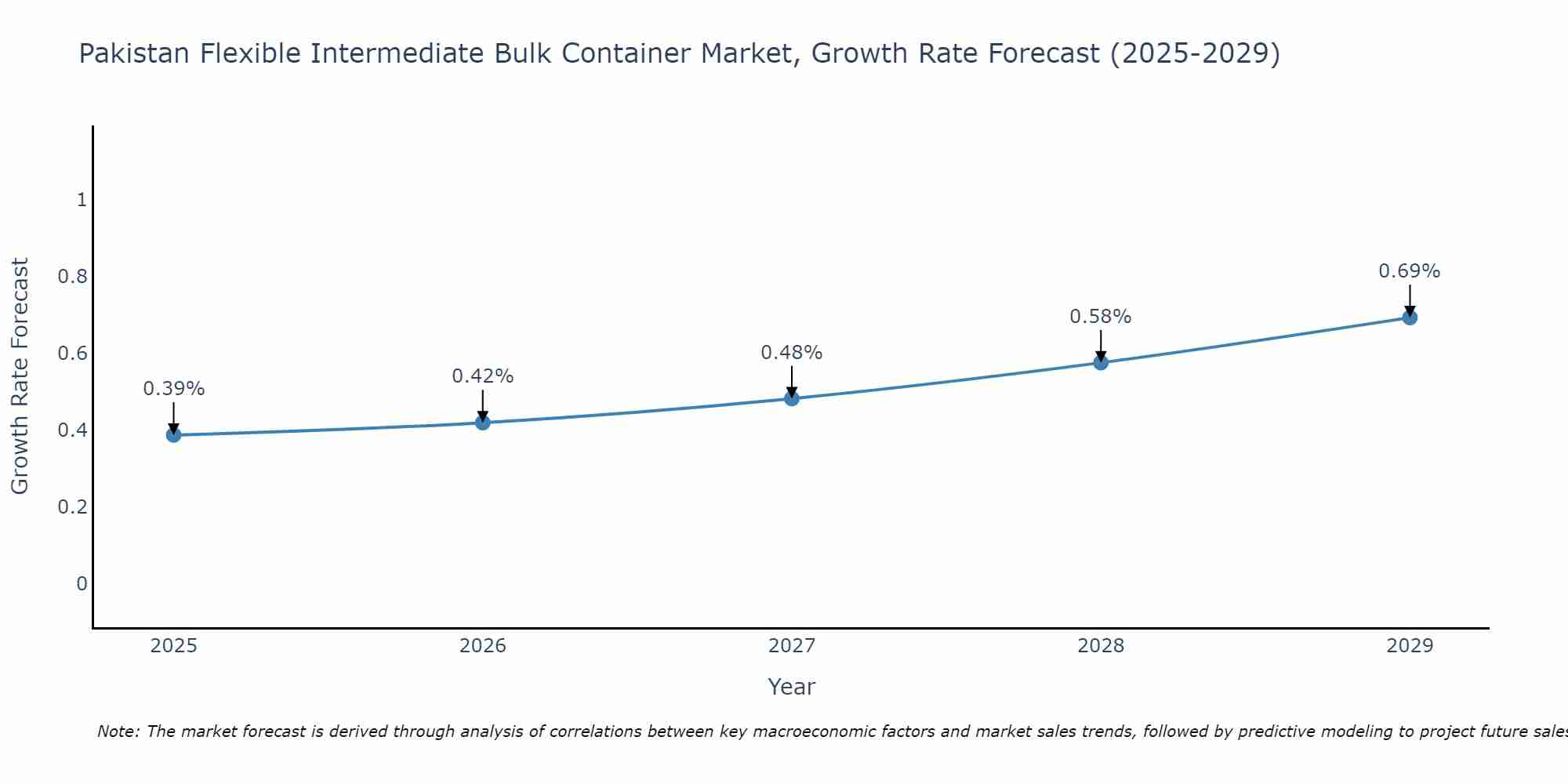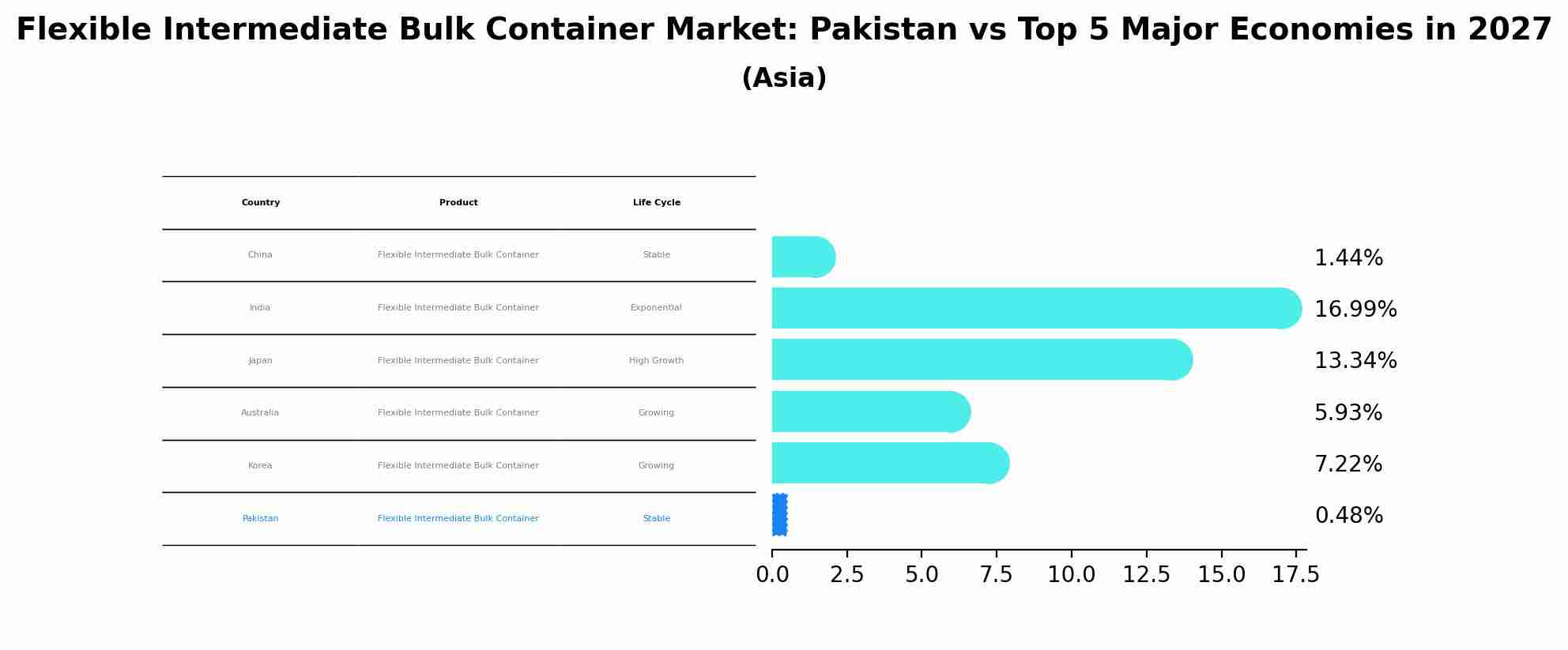Pakistan Flexible Intermediate Bulk Container Market Outlook | Share, Revenue, Forecast, Value, Trends, Companies, COVID-19 IMPACT, Growth, Analysis, Size & Industry
| Product Code: ETC373897 | Publication Date: Aug 2022 | Updated Date: Jul 2025 | Product Type: Market Research Report | |
| Publisher: 6Wresearch | Author: Dhaval Chaurasia | No. of Pages: 75 | No. of Figures: 35 | No. of Tables: 20 |
Pakistan Flexible Intermediate Bulk Container Market Size Growth Rate
The Pakistan Flexible Intermediate Bulk Container Market is poised for steady growth rate improvements from 2025 to 2029. Commencing at 0.39% in 2025, growth builds up to 0.69% by 2029.

Flexible Intermediate Bulk Container Market: Pakistan vs Top 5 Major Economies in 2027 (Asia)
Pakistan's Flexible Intermediate Bulk Container market is anticipated to experience a stable growth rate of 0.48% by 2027, reflecting trends observed in the largest economy China, followed by India, Japan, Australia and South Korea.

Pakistan Flexible Intermediate Bulk Container Market Synopsis
The Pakistan Flexible Intermediate Bulk Container (FIBC) market is experiencing steady growth due to the country`s expanding industrial and agricultural sectors. FIBCs are widely used for the transportation and storage of bulk goods such as grains, chemicals, and fertilizers. The market is driven by factors such as increasing demand for efficient and cost-effective packaging solutions, growth in international trade, and rising awareness about the benefits of using FIBCs in various industries. Key players in the Pakistan FIBC market are focusing on product innovation, customization, and sustainability to gain a competitive edge. With the government`s initiatives to promote exports and the growing adoption of FIBCs in different sectors, the market is expected to continue its growth trajectory in the coming years.
Pakistan Flexible Intermediate Bulk Container Market Trends
The Pakistan Flexible Intermediate Bulk Container (FIBC) market is witnessing several key trends. One prominent trend is the increasing demand for FIBCs in various industries such as agriculture, construction, and chemicals due to their cost-effectiveness and efficiency in bulk packaging and transportation. Additionally, there is a growing preference for environmentally friendly FIBCs made from recyclable materials to address sustainability concerns. Another trend is the adoption of innovative FIBC designs with features like enhanced durability, UV protection, and improved safety measures to meet the evolving needs of customers. Moreover, the market is experiencing a shift towards digitalization with the integration of technologies like RFID tracking systems to enhance supply chain visibility and streamline logistics operations. Overall, these trends are shaping the Pakistan FIBC market towards greater efficiency, sustainability, and technological advancement.
Pakistan Flexible Intermediate Bulk Container Market Challenges
The Pakistan Flexible Intermediate Bulk Container (FIBC) market faces several challenges, including intense competition from local and international manufacturers, fluctuating raw material prices, and a lack of standardized quality control measures. Additionally, inadequate infrastructure and transportation facilities in certain regions of Pakistan can hinder the distribution and supply chain of FIBCs. Moreover, the presence of counterfeit products in the market poses a threat to the reputation and reliability of genuine FIBC manufacturers. To remain competitive and address these challenges, companies in the Pakistan FIBC market need to focus on innovation, quality assurance, and building strong relationships with key stakeholders in the industry. Developing sustainable practices and complying with international regulations can also help enhance the market position of FIBC manufacturers in Pakistan.
Pakistan Flexible Intermediate Bulk Container Market Investment Opportunities
The Pakistan Flexible Intermediate Bulk Container (FIBC) market presents opportunities for investment due to the growing demand for efficient and cost-effective bulk packaging solutions across various industries such as agriculture, chemicals, construction, and food products. The increasing focus on enhancing supply chain efficiency, reducing transportation costs, and ensuring product safety is driving the demand for FIBCs in Pakistan. Investing in FIBC manufacturing facilities or distribution networks could be a lucrative opportunity, especially with the country`s strategic location as a key trade route in South Asia. Additionally, innovative product offerings such as antistatic FIBCs for hazardous materials or food-grade FIBCs for agricultural products could cater to specific market segments and drive growth in the Pakistan FIBC market.
Jordan Agar Market Government Policies
The Pakistan government has implemented various policies related to the Flexible Intermediate Bulk Container (FIBC) market to regulate the industry and ensure compliance with international standards. These policies include quality control measures to maintain the safety and durability of FIBCs, import regulations to monitor the inflow of FIBCs into the country, and environmental regulations to promote sustainable practices in the industry. Additionally, the government has also focused on promoting local manufacturing of FIBCs to reduce dependence on imports and boost the domestic industry. Overall, the government`s policies aim to create a conducive environment for the growth of the FIBC market in Pakistan while ensuring adherence to regulatory standards and promoting sustainable practices.
Pakistan Flexible Intermediate Bulk Container Market Future Outlook
The Pakistan Flexible Intermediate Bulk Container (FIBC) market is projected to experience steady growth in the coming years due to increasing demand from sectors such as agriculture, construction, and chemicals. Factors driving this growth include the rising need for cost-effective and efficient packaging solutions, as well as the expansion of industries requiring bulk transportation of goods. Additionally, the government`s focus on improving infrastructure and logistics in the country is expected to further boost the demand for FIBCs. Innovations in FIBC design and materials, such as enhanced durability and sustainability features, are also likely to contribute to market expansion. Overall, the Pakistan FIBC market is anticipated to witness positive growth prospects in the foreseeable future, presenting opportunities for manufacturers and suppliers in the industry.
Key Highlights of the Report:
- Pakistan Flexible Intermediate Bulk Container Market Outlook
- Market Size of Pakistan Flexible Intermediate Bulk Container Market, 2021
- Forecast of Pakistan Flexible Intermediate Bulk Container Market, 2031
- Historical Data and Forecast of Pakistan Flexible Intermediate Bulk Container Revenues & Volume for the Period 2018 - 2031
- Pakistan Flexible Intermediate Bulk Container Market Trend Evolution
- Pakistan Flexible Intermediate Bulk Container Market Drivers and Challenges
- Pakistan Flexible Intermediate Bulk Container Price Trends
- Pakistan Flexible Intermediate Bulk Container Porter's Five Forces
- Pakistan Flexible Intermediate Bulk Container Industry Life Cycle
- Historical Data and Forecast of Pakistan Flexible Intermediate Bulk Container Market Revenues & Volume By Product for the Period 2018 - 2031
- Historical Data and Forecast of Pakistan Flexible Intermediate Bulk Container Market Revenues & Volume By Type A for the Period 2018 - 2031
- Historical Data and Forecast of Pakistan Flexible Intermediate Bulk Container Market Revenues & Volume By Type B for the Period 2018 - 2031
- Historical Data and Forecast of Pakistan Flexible Intermediate Bulk Container Market Revenues & Volume By Type C for the Period 2018 - 2031
- Historical Data and Forecast of Pakistan Flexible Intermediate Bulk Container Market Revenues & Volume By Type D for the Period 2018 - 2031
- Historical Data and Forecast of Pakistan Flexible Intermediate Bulk Container Market Revenues & Volume By End-Use for the Period 2018 - 2031
- Historical Data and Forecast of Pakistan Flexible Intermediate Bulk Container Market Revenues & Volume By Food for the Period 2018 - 2031
- Historical Data and Forecast of Pakistan Flexible Intermediate Bulk Container Market Revenues & Volume By Chemical for the Period 2018 - 2031
- Historical Data and Forecast of Pakistan Flexible Intermediate Bulk Container Market Revenues & Volume By Pharmaceuticals for the Period 2018 - 2031
- Historical Data and Forecast of Pakistan Flexible Intermediate Bulk Container Market Revenues & Volume By Others for the Period 2018 - 2031
- Pakistan Flexible Intermediate Bulk Container Import Export Trade Statistics
- Market Opportunity Assessment By Product
- Market Opportunity Assessment By End-Use
- Pakistan Flexible Intermediate Bulk Container Top Companies Market Share
- Pakistan Flexible Intermediate Bulk Container Competitive Benchmarking By Technical and Operational Parameters
- Pakistan Flexible Intermediate Bulk Container Company Profiles
- Pakistan Flexible Intermediate Bulk Container Key Strategic Recommendations
Frequently Asked Questions About the Market Study (FAQs):
- Single User License$ 1,995
- Department License$ 2,400
- Site License$ 3,120
- Global License$ 3,795
Search
Related Reports
- ASEAN Bearings Market (2025-2031) | Strategy, Consumer Insights, Analysis, Investment Trends, Opportunities, Growth, Size, Share, Industry, Revenue, Segments, Value, Segmentation, Supply, Forecast, Restraints, Outlook, Competition, Drivers, Trends, Demand, Pricing Analysis, Competitive, Strategic Insights, Companies, Challenges
- Europe Flooring Market (2025-2031) | Outlook, Share, Industry, Trends, Forecast, Companies, Revenue, Size, Analysis, Growth & Value
- Saudi Arabia Manlift Market (2025-2031) | Outlook, Size, Growth, Trends, Companies, Industry, Revenue, Value, Share, Forecast & Analysis
- Uganda Excavator, Crane, and Wheel Loaders Market (2025-2031) | Strategy, Consumer Insights, Analysis, Investment Trends, Opportunities, Growth, Size, Share, Industry, Revenue, Segments, Value, Segmentation, Supply, Forecast, Restraints, Outlook, Competition, Drivers, Trends, Demand, Pricing Analysis, Competitive, Strategic Insights, Companies, Challenges
- Rwanda Excavator, Crane, and Wheel Loaders Market (2025-2031) | Strategy, Consumer Insights, Analysis, Investment Trends, Opportunities, Growth, Size, Share, Industry, Revenue, Segments, Value, Segmentation, Supply, Forecast, Restraints, Outlook, Competition, Drivers, Trends, Demand, Pricing Analysis, Competitive, Strategic Insights, Companies, Challenges
- Kenya Excavator, Crane, and Wheel Loaders Market (2025-2031) | Strategy, Consumer Insights, Analysis, Investment Trends, Opportunities, Growth, Size, Share, Industry, Revenue, Segments, Value, Segmentation, Supply, Forecast, Restraints, Outlook, Competition, Drivers, Trends, Demand, Pricing Analysis, Competitive, Strategic Insights, Companies, Challenges
- Angola Excavator, Crane, and Wheel Loaders Market (2025-2031) | Strategy, Consumer Insights, Analysis, Investment Trends, Opportunities, Growth, Size, Share, Industry, Revenue, Segments, Value, Segmentation, Supply, Forecast, Restraints, Outlook, Competition, Drivers, Trends, Demand, Pricing Analysis, Competitive, Strategic Insights, Companies, Challenges
- Israel Intelligent Transport System Market (2025-2031) | Strategy, Consumer Insights, Analysis, Investment Trends, Opportunities, Growth, Size, Share, Industry, Revenue, Segments, Value, Segmentation, Supply, Forecast, Restraints, Outlook, Competition, Drivers, Trends, Demand, Pricing Analysis, Competitive, Strategic Insights, Companies, Challenges
- Uganda Precast and Aggregate Market (2025-2031) | Strategy, Consumer Insights, Analysis, Investment Trends, Opportunities, Growth, Size, Share, Industry, Revenue, Segments, Value, Segmentation, Supply, Forecast, Restraints, Outlook, Competition, Drivers, Trends, Demand, Pricing Analysis, Competitive, Strategic Insights, Companies, Challenges
- Australia IT Asset Disposal Market (2025-2031) | Strategy, Consumer Insights, Analysis, Investment Trends, Opportunities, Growth, Size, Share, Industry, Revenue, Segments, Value, Segmentation, Supply, Forecast, Restraints, Outlook, Competition, Drivers, Trends, Demand, Pricing Analysis, Competitive, Strategic Insights, Companies, Challenges
Industry Events and Analyst Meet
Our Clients
Whitepaper
- Middle East & Africa Commercial Security Market Click here to view more.
- Middle East & Africa Fire Safety Systems & Equipment Market Click here to view more.
- GCC Drone Market Click here to view more.
- Middle East Lighting Fixture Market Click here to view more.
- GCC Physical & Perimeter Security Market Click here to view more.
6WResearch In News
- Doha a strategic location for EV manufacturing hub: IPA Qatar
- Demand for luxury TVs surging in the GCC, says Samsung
- Empowering Growth: The Thriving Journey of Bangladesh’s Cable Industry
- Demand for luxury TVs surging in the GCC, says Samsung
- Video call with a traditional healer? Once unthinkable, it’s now common in South Africa
- Intelligent Buildings To Smooth GCC’s Path To Net Zero













